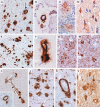TREM2 variants in Alzheimer's disease
- PMID: 23150934
- PMCID: PMC3631573
- DOI: 10.1056/NEJMoa1211851
TREM2 variants in Alzheimer's disease
Abstract
Background: Homozygous loss-of-function mutations in TREM2, encoding the triggering receptor expressed on myeloid cells 2 protein, have previously been associated with an autosomal recessive form of early-onset dementia.
Methods: We used genome, exome, and Sanger sequencing to analyze the genetic variability in TREM2 in a series of 1092 patients with Alzheimer's disease and 1107 controls (the discovery set). We then performed a meta-analysis on imputed data for the TREM2 variant rs75932628 (predicted to cause a R47H substitution) from three genomewide association studies of Alzheimer's disease and tested for the association of the variant with disease. We genotyped the R47H variant in an additional 1887 cases and 4061 controls. We then assayed the expression of TREM2 across different regions of the human brain and identified genes that are differentially expressed in a mouse model of Alzheimer's disease and in control mice.
Results: We found significantly more variants in exon 2 of TREM2 in patients with Alzheimer's disease than in controls in the discovery set (P=0.02). There were 22 variant alleles in 1092 patients with Alzheimer's disease and 5 variant alleles in 1107 controls (P<0.001). The most commonly associated variant, rs75932628 (encoding R47H), showed highly significant association with Alzheimer's disease (P<0.001). Meta-analysis of rs75932628 genotypes imputed from genomewide association studies confirmed this association (P=0.002), as did direct genotyping of an additional series of 1887 patients with Alzheimer's disease and 4061 controls (P<0.001). Trem2 expression differed between control mice and a mouse model of Alzheimer's disease.
Conclusions: Heterozygous rare variants in TREM2 are associated with a significant increase in the risk of Alzheimer's disease. (Funded by Alzheimer's Research UK and others.).
Figures


Comment in
-
Variant TREM2 as risk factor for Alzheimer's disease.N Engl J Med. 2013 Jan 10;368(2):182-4. doi: 10.1056/NEJMe1213157. Epub 2012 Nov 14. N Engl J Med. 2013. PMID: 23151315 No abstract available.
-
Alzheimer disease: TREM2 linked to late-onset AD.Nat Rev Neurol. 2013 Jan;9(1):5. doi: 10.1038/nrneurol.2012.254. Epub 2012 Dec 4. Nat Rev Neurol. 2013. PMID: 23208114 No abstract available.
-
TREM2: a new risk factor for Alzheimer's disease.Clin Genet. 2013 Jun;83(6):525-6. doi: 10.1111/cge.12108. Clin Genet. 2013. PMID: 23347262 No abstract available.
-
TREM2 and neurodegenerative disease.N Engl J Med. 2013 Oct 17;369(16):1564-5. doi: 10.1056/NEJMc1306509. N Engl J Med. 2013. PMID: 24131184 Free PMC article. No abstract available.
-
TREM2 and neurodegenerative disease.N Engl J Med. 2013 Oct 17;369(16):1565. doi: 10.1056/NEJMc1306509. N Engl J Med. 2013. PMID: 24131185 No abstract available.
-
TREM2 and neurodegenerative disease.N Engl J Med. 2013 Oct 17;369(16):1568. doi: 10.1056/NEJMc1306509. N Engl J Med. 2013. PMID: 24131188 No abstract available.
-
TREM2 and neurodegenerative disease.N Engl J Med. 2013 Oct 17;369(16):1569-70. doi: 10.1056/NEJMc1306509. N Engl J Med. 2013. PMID: 24143816 No abstract available.
References
-
- Goate A, Chartier-Harlin MC, Mullan M, et al. Segregation of a missense mutation in the amyloid precursor protein gene with familial Alzheimer's disease. Nature. 1991;349:704–6. - PubMed
-
- Rogaev EI, Sherrington R, Rogaeva EA, et al. Familial Alzheimer's disease in kindreds with missense mutations in a gene on chromosome 1 related to the Alzheimer's disease type 3 gene. Nature. 1995;376:775–8. - PubMed
-
- Sherrington R, Rogaev EI, Liang Y, et al. Cloning of a gene bearing missense mutations in early-onset familial Alzheimer's disease. Nature. 1995;375:754–60. - PubMed
Publication types
MeSH terms
Substances
Grants and funding
- MR/K013041/1/MRC_/Medical Research Council/United Kingdom
- MC_U123192748/MRC_/Medical Research Council/United Kingdom
- U24 AG021886/AG/NIA NIH HHS/United States
- P50 AG016574/AG/NIA NIH HHS/United States
- P50 AG008702/AG/NIA NIH HHS/United States
- CAPMC/ CIHR/Canada
- U24 AG056270/AG/NIA NIH HHS/United States
- MC_G1000735/MRC_/Medical Research Council/United Kingdom
- G1100695/MRC_/Medical Research Council/United Kingdom
- 089698/WT_/Wellcome Trust/United Kingdom
- Z01 AG000950-10/AG/NIA NIH HHS/United States
- G0701441/MRC_/Medical Research Council/United Kingdom
- R01 AG041797/AG/NIA NIH HHS/United States
- R01 AG18023/AG/NIA NIH HHS/United States
- P30 NS069329/NS/NINDS NIH HHS/United States
- 095317/WT_/Wellcome Trust/United Kingdom
- U01 AG006786/AG/NIA NIH HHS/United States
- G0802462/MRC_/Medical Research Council/United Kingdom
- 5P30 NS069329-02/NS/NINDS NIH HHS/United States
- 1R01 AG041797-01/AG/NIA NIH HHS/United States
- G0701075/MRC_/Medical Research Council/United Kingdom
- R01 AG042611/AG/NIA NIH HHS/United States
- G0300429/MRC_/Medical Research Council/United Kingdom
- P50 AG005681/AG/NIA NIH HHS/United States
- G0902227/MRC_/Medical Research Council/United Kingdom
- Z01 AG000950/ImNIH/Intramural NIH HHS/United States
- 089703/WT_/Wellcome Trust/United Kingdom
- 2P50 AG005681-27/AG/NIA NIH HHS/United States
- 081864/WT_/Wellcome Trust/United Kingdom
- R01 AG018023/AG/NIA NIH HHS/United States
LinkOut - more resources
Full Text Sources
Other Literature Sources
Medical
Molecular Biology Databases
